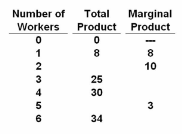Examples of comparative advantage often begin with two countries that each produce the same two goods. Each country is then shown to have a comparative advantage in producing the good it can produce at a lower opportunity cost, and specializes in the
production of the good for which it has a comparative advantage. How do these examples prove that both nations are made better off as a result of trade than they would be without trade?
What will be an ideal response?
To show that both countries are better off it is necessary to demonstrate that total consumption, not just production, of both goods is greater after trade. If a country specializes completely in producing one good—apples, for example—it has given up the opportunity to produce another good that consumers value; let's say this other good is plums. Apple lovers now have more of the good they like, but the country as a whole cannot be better off unless the change in production benefits plum lovers too. This can be done by trading some of the additional apples that are produced for some of the plums the other country has produced. Trade may benefit apple lovers more than plum lovers (or vice versa) but if, after trade, more of both goods can be consumed then trade has unambiguously made all consumers better off than they were previously.
You might also like to view...
The economic way of thinking pays special attention to costs, assumes individuals seek to maximize some objective, and focuses on choices at the margin.
a. true b. false
Refer to the data. When two workers are employed:

A. total product is 20.
B. total product is 18.
C. average product is 10.
D. total product cannot be determined from the information given.